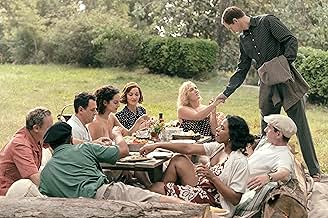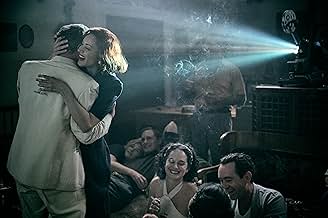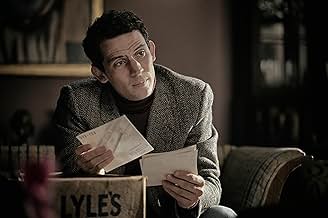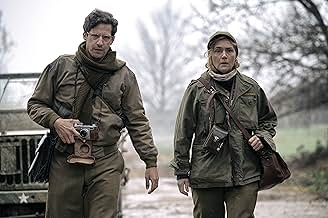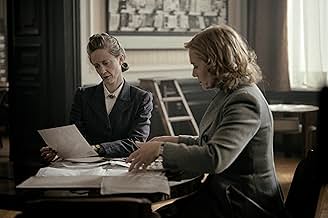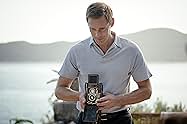War correspondent Lee Miller travels to the front lines of World War II to embark on a mission to uncover the hidden truths of the Third Reich. But in the wake of betrayal, a reckoning will ... Read allWar correspondent Lee Miller travels to the front lines of World War II to embark on a mission to uncover the hidden truths of the Third Reich. But in the wake of betrayal, a reckoning will come over the truths of her own past.War correspondent Lee Miller travels to the front lines of World War II to embark on a mission to uncover the hidden truths of the Third Reich. But in the wake of betrayal, a reckoning will come over the truths of her own past.
- Nominated for 1 BAFTA Award
- 3 wins & 17 nominations total
Summary
Reviewers say 'Lee' is a biographical drama about Lee Miller, with Kate Winslet's performance as a standout. Many praise Winslet and the film's depiction of Miller's life. However, some criticize the pacing, script, and direction, finding it slow and lacking emotional depth. The film's handling of historical events receives mixed reactions. The supporting cast is noted, though some feel underutilized. Cinematography and production design are praised, but narrative structure and character development are contentious.
Featured reviews
It's a partial biopic of photojournalist Lee Miller (Kate Winslet) set in 1977 with flashbacks to 1938-1945. The film frames its story as an interview of Miller by a young man (Josh O'Connor) in 1977. Sequential flashbacks to Miller's life begin in 1938 and then follow.
Miller is a former American model who has taken up photography as an artistic form and hangs out with an artsy crowd in France, where she has lived for a time. Among her friends are Jean (Patrick Mille) and Solange d'Ayen. She meets Roland Penrose (Alexander Skarsgard), a Quaker artist and poet in Great Britain. He is also part of her artistic community and they begin a relationship. Miller moves to London, where she secures a job with the British Vogue magazine edited by Audrey Withers (Andrea Riseborough).
After World War II begins, Miller finds her way to the front lines as a war photojournalist for Vogue. "Lee" depicts some of her dramatic experiences, which resulted in memorable photographs from battles, the capture of Berlin, and the death camps, often together with a Life magazine photographer, David Scherman (Andy Samberg). Miller's personality throughout is hard-driven and sometimes impulsive as she copes through chain-smoking and alcohol consumption. At the film's end, we learn more about her motivation.
"Lee" is too one-dimensional, though Kate Winslet's strong performance reflects a complex and troubled personality. There are too many characters with shallow development, leaving Winslet on her own. The lack of context also detracts, as her past is vaguely referenced (she was married to an unmentioned man throughout the war), and we learn nothing of her life after the war (she did marry Roland). Thus, "Lee's" limitations derive from how an array of screenwriters made the adaptations from the 1985 biography.
Miller is a former American model who has taken up photography as an artistic form and hangs out with an artsy crowd in France, where she has lived for a time. Among her friends are Jean (Patrick Mille) and Solange d'Ayen. She meets Roland Penrose (Alexander Skarsgard), a Quaker artist and poet in Great Britain. He is also part of her artistic community and they begin a relationship. Miller moves to London, where she secures a job with the British Vogue magazine edited by Audrey Withers (Andrea Riseborough).
After World War II begins, Miller finds her way to the front lines as a war photojournalist for Vogue. "Lee" depicts some of her dramatic experiences, which resulted in memorable photographs from battles, the capture of Berlin, and the death camps, often together with a Life magazine photographer, David Scherman (Andy Samberg). Miller's personality throughout is hard-driven and sometimes impulsive as she copes through chain-smoking and alcohol consumption. At the film's end, we learn more about her motivation.
"Lee" is too one-dimensional, though Kate Winslet's strong performance reflects a complex and troubled personality. There are too many characters with shallow development, leaving Winslet on her own. The lack of context also detracts, as her past is vaguely referenced (she was married to an unmentioned man throughout the war), and we learn nothing of her life after the war (she did marry Roland). Thus, "Lee's" limitations derive from how an array of screenwriters made the adaptations from the 1985 biography.
The story of former model turned photographer Elizabeth Miller, Lee, who recounts her times as War correspondent for Vogue during the second world war.
The two key elements, Lee's story, and the performance from Kate Winslet. Two things that make this a pretty good movie. It's not one I'd want to watch again in a hurry, as it is a little slow moving in parts, but I'm glad I saw it.
It is a fascinating story, one that is definitely worth some further reading on, Lee was definitely a pioneering figure, going into a world where women were excluded.
It's very well made and nicely directed, the production team did a fine job, it looks very good.
Winslet absolutely nails it, but at times it feels like a one woman show, some of the supporting characters are a little thin and half baked. Andrea Riseborough and Josh O'Connor are both rather good.
It's definitely worth seeing, even if just for Winslet's fine performance.
7/10.
The two key elements, Lee's story, and the performance from Kate Winslet. Two things that make this a pretty good movie. It's not one I'd want to watch again in a hurry, as it is a little slow moving in parts, but I'm glad I saw it.
It is a fascinating story, one that is definitely worth some further reading on, Lee was definitely a pioneering figure, going into a world where women were excluded.
It's very well made and nicely directed, the production team did a fine job, it looks very good.
Winslet absolutely nails it, but at times it feels like a one woman show, some of the supporting characters are a little thin and half baked. Andrea Riseborough and Josh O'Connor are both rather good.
It's definitely worth seeing, even if just for Winslet's fine performance.
7/10.
Have just got home from watching "LEE" at my local Picture House.
Blimey, that was DARK. Well, it isn't all dark, but by the time you get to the last half hour... oooft. Let's just say that "feelgood" isn't a term anyone's ever going to apply to this one.
It's not like I went in unprepared: I'd seen Kate Winslet doing the promotional chat show appearances, and as I am already a great admirer of Lee Miller's photojournalism, I knew the kind of subject matter we'd inevitably be exploring, but still... don't say you haven't been warned. This film presents you with you the hideous fact of Nazi genocide, very convincingly as the revelation it must have been in the moment, without (thankfully) a scrap of sentimentality.
Winslet is magnificent in the title role - as is everyone else, to be honest: there are no shoddy performances to be found - and, speaking as a Rolleiflex TLR user myself, it was clear that she had done her homework viz how to wield that lovely machine convincingly. There were moments when the nit-picky photography pedant in me did query whether some of the interior photos were being taken in such low light that it was unlikely to have left any usable impression on the relatively slow film stock available in the 1940s, but let's not quibble!
It's quite a long movie and events are presented in a simple, linear fashion (via a series of chronological flashbacks) with rather uniform pacing throughout - personally, I would have preferred a bit more variation in pace; your taste may differ.
My only really negative criticism has to do with one, frankly bizarre, piece of casting. The role of Englishman Roland Penrose is given to Swedish star Alexander Skarsgård - whose plucky attempt at an English accent is ...I think "variable" is the kindest word for it. It was hard to tell what part of England he was supposed to be from, or indeed what social class, and there were several moments when he didn't sound any kind of English at all. I had to suspend my disbelief on some pretty strong elastic whenever he opened his mouth. Ah well... go figure!
Blimey, that was DARK. Well, it isn't all dark, but by the time you get to the last half hour... oooft. Let's just say that "feelgood" isn't a term anyone's ever going to apply to this one.
It's not like I went in unprepared: I'd seen Kate Winslet doing the promotional chat show appearances, and as I am already a great admirer of Lee Miller's photojournalism, I knew the kind of subject matter we'd inevitably be exploring, but still... don't say you haven't been warned. This film presents you with you the hideous fact of Nazi genocide, very convincingly as the revelation it must have been in the moment, without (thankfully) a scrap of sentimentality.
Winslet is magnificent in the title role - as is everyone else, to be honest: there are no shoddy performances to be found - and, speaking as a Rolleiflex TLR user myself, it was clear that she had done her homework viz how to wield that lovely machine convincingly. There were moments when the nit-picky photography pedant in me did query whether some of the interior photos were being taken in such low light that it was unlikely to have left any usable impression on the relatively slow film stock available in the 1940s, but let's not quibble!
It's quite a long movie and events are presented in a simple, linear fashion (via a series of chronological flashbacks) with rather uniform pacing throughout - personally, I would have preferred a bit more variation in pace; your taste may differ.
My only really negative criticism has to do with one, frankly bizarre, piece of casting. The role of Englishman Roland Penrose is given to Swedish star Alexander Skarsgård - whose plucky attempt at an English accent is ...I think "variable" is the kindest word for it. It was hard to tell what part of England he was supposed to be from, or indeed what social class, and there were several moments when he didn't sound any kind of English at all. I had to suspend my disbelief on some pretty strong elastic whenever he opened his mouth. Ah well... go figure!
You have got to admire Kate Winslet for her determination to make a film about Lee Miller, the pioneering photographer who was one of the first to see the nazi death camps and who fought for her right to record history as she saw it, and as a woman. Winslet campaigned for years and was consistently turned down but she did finally achieve her aim, and the resulting film is a pretty good, sometimes very good. Winslet as Lee Miller is excellent, and although initially the film meanders through millers career in the early stages of the war, later, as she gets more involved, it's a much better film, often impressive and insightful and even powerful. Miller is someone worth commemorating, and this is a fine tribute.
Greetings again from the darkness. Being courageous and heroic doesn't mean one must wear a cape and possess super powers. In fact, some of the most courageous folks use their words (spoken and written), their feet (for marching into battle), and as we learn here, even their eyes. Lee Miller is a famous photojournalist who used her words to get to the front lines of WWII, her feet to march with soldiers, and her eyes to decide where to focus her camera. The film is based on the biography, "The Lives of Lee Miller", by her son Antony Penrose. It's directed by renowned choreographer Ellen Kuras (her feature film directorial debut) and co-written by Liz Hannah, Marion Hume, John Collee, and Lem Dobbs.
Oscar winner Kate Winslet stars as Lee Miller, and her fierce and committed performance validates what a passion project this was for her, and just how hard she worked to bring the project to fruition. Lee Miller was a well-known fashion model, and we see her hanging out with her band of artistic friends in pre-war France. It's here where she first meets Roland Penrose (Alexander Skarsgard), and their initial intellectual bantering leads right to the bedroom. This after we hear Ms. Miller proclaim that she had ever only been good at drinking, having sex, and taking pictures. She speaks this line in 1977 while being interviewed (by Josh O'Connor, CHALLENGERS, 2024) about her life. It's this interview that provides some structure to the film, while confirming that drinking and smoking were hobbies until the end.
It's really Lee's photographs that guide us through each phase. She and Roland relocate to London during the war, and soon enough she's taking pictures under the guidance of British Vogue editor Audrey Withers (Andrea Riseborough). Continually having to stand up for herself after being rebuked for being a woman doing a man's job, Lee partners with (and ultimately befriends) Life magazine photographer David E Scherman (a surprisingly effective Andy Samberg). Their work documenting history becomes historic in itself. After hearing about the "missing", they were the first journalists to document Dachau concentration camp and the tragic prisoner trains.
Although British Vogue refused to publish the photographs as being too "disturbing", the U. S. magazine did publish, creating awareness of the atrocities. The segment that leads to the infamous photo of Lee bathing in Hitler's tubs is handled expertly. If there is a flaw in the film, it's that we never really get to know Lee's friends, so as she re-connects with Solange (Oscar winner Marion Cotillard), their meeting doesn't hit as hard as it should. Still, the cinematography from Pawel Edelman and the accomplished performance by Kate Winslet, do justice to the stunning (actual) photographs shown. There is a dramatized twist near the film's end that pays homage to Lee and her story. An early comment about Hitler is all too relevant today, and the battle scenes and photographs reinforce what courage Lee Miller exhibited.
Opens in theaters on September 27, 2024.
Oscar winner Kate Winslet stars as Lee Miller, and her fierce and committed performance validates what a passion project this was for her, and just how hard she worked to bring the project to fruition. Lee Miller was a well-known fashion model, and we see her hanging out with her band of artistic friends in pre-war France. It's here where she first meets Roland Penrose (Alexander Skarsgard), and their initial intellectual bantering leads right to the bedroom. This after we hear Ms. Miller proclaim that she had ever only been good at drinking, having sex, and taking pictures. She speaks this line in 1977 while being interviewed (by Josh O'Connor, CHALLENGERS, 2024) about her life. It's this interview that provides some structure to the film, while confirming that drinking and smoking were hobbies until the end.
It's really Lee's photographs that guide us through each phase. She and Roland relocate to London during the war, and soon enough she's taking pictures under the guidance of British Vogue editor Audrey Withers (Andrea Riseborough). Continually having to stand up for herself after being rebuked for being a woman doing a man's job, Lee partners with (and ultimately befriends) Life magazine photographer David E Scherman (a surprisingly effective Andy Samberg). Their work documenting history becomes historic in itself. After hearing about the "missing", they were the first journalists to document Dachau concentration camp and the tragic prisoner trains.
Although British Vogue refused to publish the photographs as being too "disturbing", the U. S. magazine did publish, creating awareness of the atrocities. The segment that leads to the infamous photo of Lee bathing in Hitler's tubs is handled expertly. If there is a flaw in the film, it's that we never really get to know Lee's friends, so as she re-connects with Solange (Oscar winner Marion Cotillard), their meeting doesn't hit as hard as it should. Still, the cinematography from Pawel Edelman and the accomplished performance by Kate Winslet, do justice to the stunning (actual) photographs shown. There is a dramatized twist near the film's end that pays homage to Lee and her story. An early comment about Hitler is all too relevant today, and the battle scenes and photographs reinforce what courage Lee Miller exhibited.
Opens in theaters on September 27, 2024.
Did you know
- TriviaBased on "The Lives of Lee Miller," the only authorized biography of Lee Miller's life, written by her own son, Anthony Penrose, and published in 1985.
- GoofsArinze Kene who plays Major Jonesy is an African American in charge of white troops in 1944. African American soldiers did not see combat until later that year and African American officers would not have been in charge of white troops until after the desegregation of the armed forces in 1948.
- Quotes
Lee Miller: [Handing a knife to a girl she has just saved from rape] Next time, cut it off.
- Crazy creditsThe closing credits have some "what happened to" explanations ; and some of Lee's original photos, often alongside the ones which were recreated for the film.
- ConnectionsFeatured in The 7PM Project: Episode dated 21 October 2024 (2024)
- How long is Lee?Powered by Alexa
Details
- Release date
- Countries of origin
- Official site
- Languages
- Also known as
- Lee
- Filming locations
- Production companies
- See more company credits at IMDbPro
Box office
- Gross US & Canada
- $2,005,488
- Opening weekend US & Canada
- $713,255
- Sep 29, 2024
- Gross worldwide
- $24,612,473
- Runtime1 hour 57 minutes
- Color
- Sound mix
- Aspect ratio
- 1.85 : 1
Contribute to this page
Suggest an edit or add missing content








